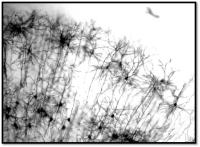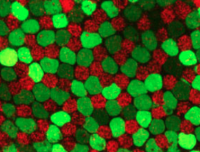CNS Shared Resources
The Center for Neuroscience supports the UC Davis Conte Center, the interdisciplinary Program in Memory and Plasticity, and the Vision Sciences Core Program. We also provide an array of shared facilities and equipment within our center, including an MRI Facility and Mock MRI Scanner, a Mouse Behavior Suite, a CNS Imaging Suite, the Ted Jones Microscopy Lab, a Shared Molecular Biology Suite, and access to a High-Performance Computing Cluster.

Memory and Plasticity Program
In 2016, the CNS supported the formation of the Memory and Plasticity (MAP) Program directed by Dr. Charan Ranganath. Through an annual symposium, quarterly meetings, and a Seed Grant for Collaborative Research program, the MAP Program was designed to unite the deep but dispersed memory and plasticity faculty across UC Davis. A major goal of the MAP Program is to stimulate new cross disciplinary collaborative research between MAP faculty and members of the campus community through seed grants. The annual seed grant competition awards two one-year grants of $25,000 each.

UC Davis Conte Center
The Conte Center (P50MH106438-06) Neuroimmune Mechanisms of Psychiatric Disorders was initially awarded in 2015 with Dr. Cameron Carter as PI and then was revised and renewed in 2021 with Dr. Carter and Dr. Kimberley McAllister as co-MPI. One of only 13 such centers in the U.S., the Conte Center is the flagship mechanism for supporting “big science” by the NIMH, providing $15 million in support for five projects and two cores over five years.

Vision Sciences Core Program
Vision research at UC Davis is supported by an NEI vision core grant (P30), directed by Dr. Martin Usrey. The goal of this Core Grant is to support vision science across UC Davis by providing cost-efficient, stable, and shared resources that are not generally available to individual laboratories. It enhances collaborations and translational research among a large group of 35 funded vision scientists at UC Davis. The cores are: (i) Software Engineering, (ii) Molecular Construct and Packaging, (iii) Microscopy and Tissue Processing, (iv) Small Animal Ocular Imaging, and (v) Large Animal.
MRI Facility and Mock MRI Scanner
The MRI facility houses a 3 Tesla Siemens Skyra scanner along with all peripheral devices needed to perform structural, functional, and molecular imaging in humans and large animals. This facility is run and supported by the UC Davis Imaging Research Center, directed by Dr. Cameron Carter, a core CNS faculty member.
Mouse Behavior Suite
This suite is directed by Drs. Jennifer Whistler and Brian Wiltgen and currently supports research in 8 faculty labs. This suite provides space, equipment and expertise on behavioral assays that members of the CNS can use for a nominal annual access fee. This core facility contains 8 isolated rooms of behavioral space with available behavioral tasks including: operant conditioning, fear conditioning, social recognition, open field, elevated plus maze, conditioned place preference, radial and Y-maze, marble burying, grooming, novel object recognition, tail suspension, forced swim, and several motor and pain assays. Equipment includes two rooms outfitted with Noldus Ethovision XT. Maze equipment includes elevated plus maze, water maze, and T maze. Several of the behavior boxes are equipped with lasers for optogenetics and fiber photometry.
CNS Imaging Suite
This suite is directed by Drs. Fioravante and Whistler and consists of two rooms housing:
• Zeiss LSM 800 3 channel system with 2 MA-PMT and a 32-ch GaAsp Airyscan Detector, 4 laser line inverted confocal with 30% Airyscan: Trainees have 24 hr access to this shared facility and a workstation with Huygens Professional software for deconvolution.
• Array tomography facility equipped with a Leica ultramicrotome for preparing ribbons of 70 nm serial sections and a Zeiss Axio Imager. M2 Upright Fluorescence Microscope with a Lumencor SOLA light source, a custom motorized scanning stage, ORCA-Flash4.0 LT Camera, Zen acquisition and analysis software, and custom AT analysis software.
The Ted Jones Microscopy Lab
This laboratory dedicated to the late CNS Director, Edward G. Jones, contains a Neurolucida imaging system, three Nikon brightfield and epifluorescent microscopes (E600, E800, E1000) with digital cameras and motorized stages, a Nikon SMZ 1500 stereomicroscope with digital camera system, and a Wild Camera lucida setup.
Shared Molecular Biology Suite
This suite contains shared ultracentrifuges (Sorvall), other general equipment necessary for molecular biological experiment (including ovens, incubators, heated shakers, and a Bio-Rad gel documentation system), a Molecular Devices plate reader for DNA quantification, a Li-Cor Odyssey imaging system to visualize Western blots, a Nanodrop instrument, and a BioRad RT-PCR system.
High-Performance Computing Cluster
The CNS purchased four nodes in June 2017 in the Crick cluster on campus. The Crick Cluster is a cluster, which combines servers provided by the Department of Molecular and Cellular Biology and Microbiology & Molecular Genetics and now the Center for Neuroscience. It is configured so that each department get priority access on the nodes they purchase but can also take advantage of free cores on nodes from the other departments. The cluster currently is made up of nineteen standard nodes and two big memory nodes.
